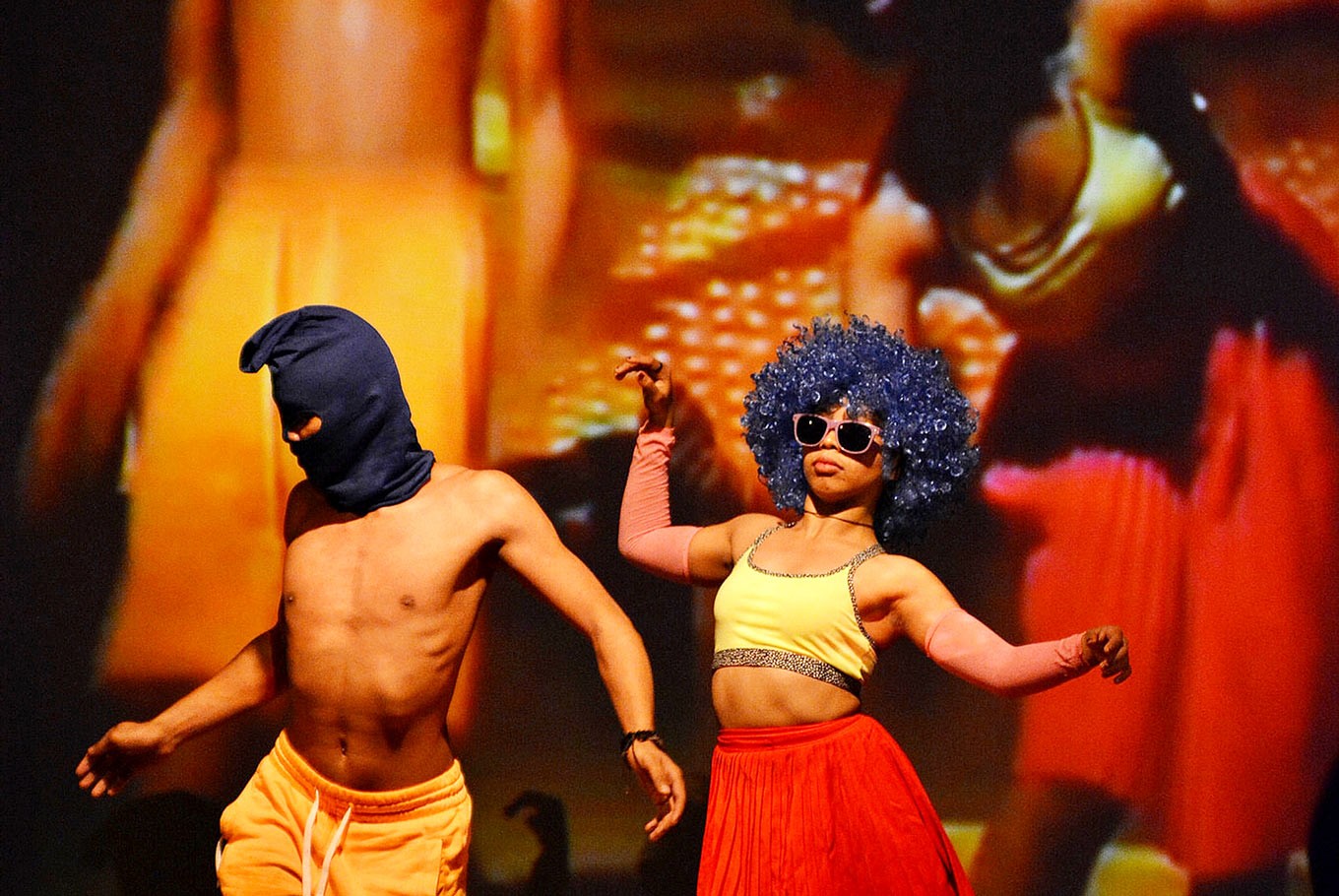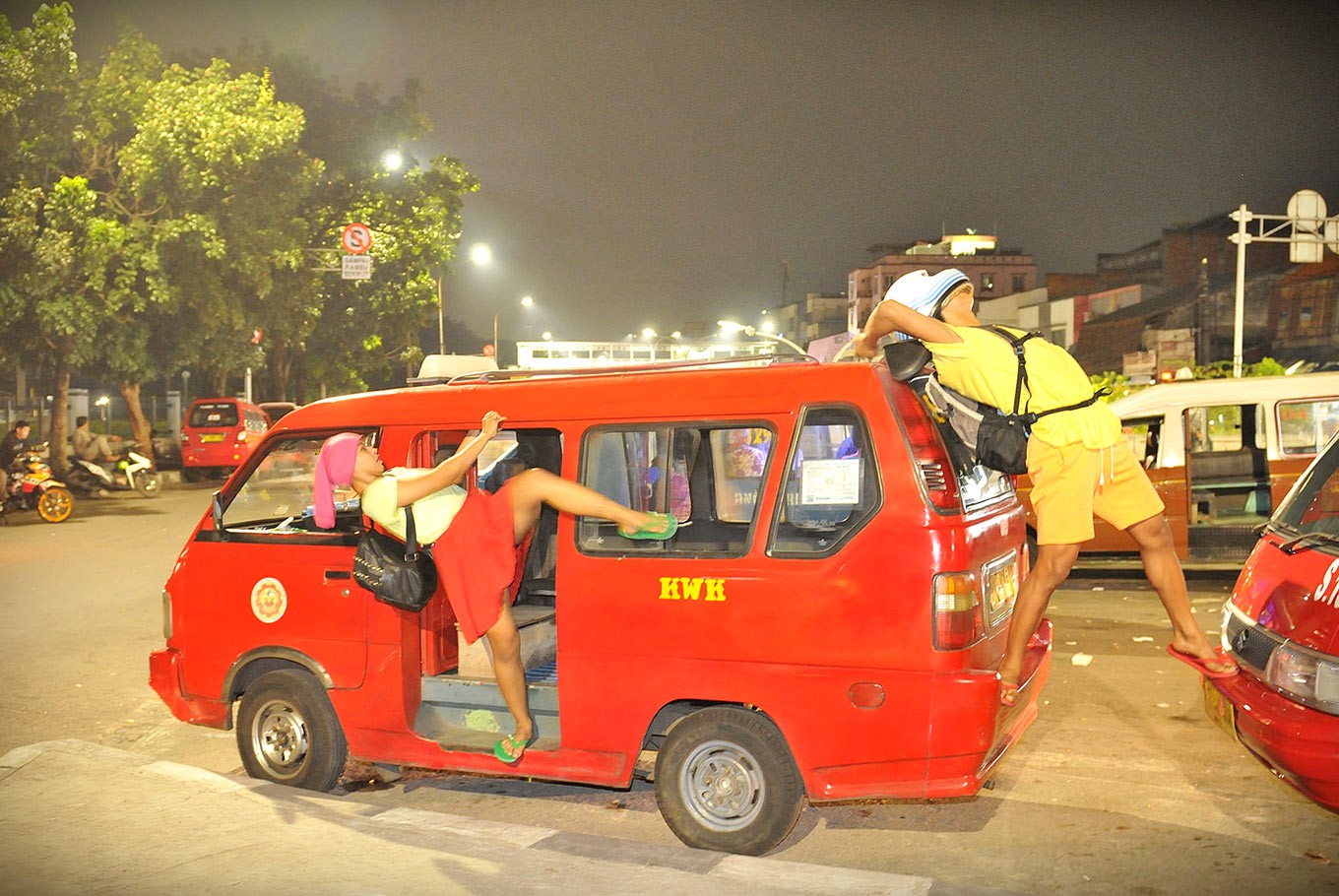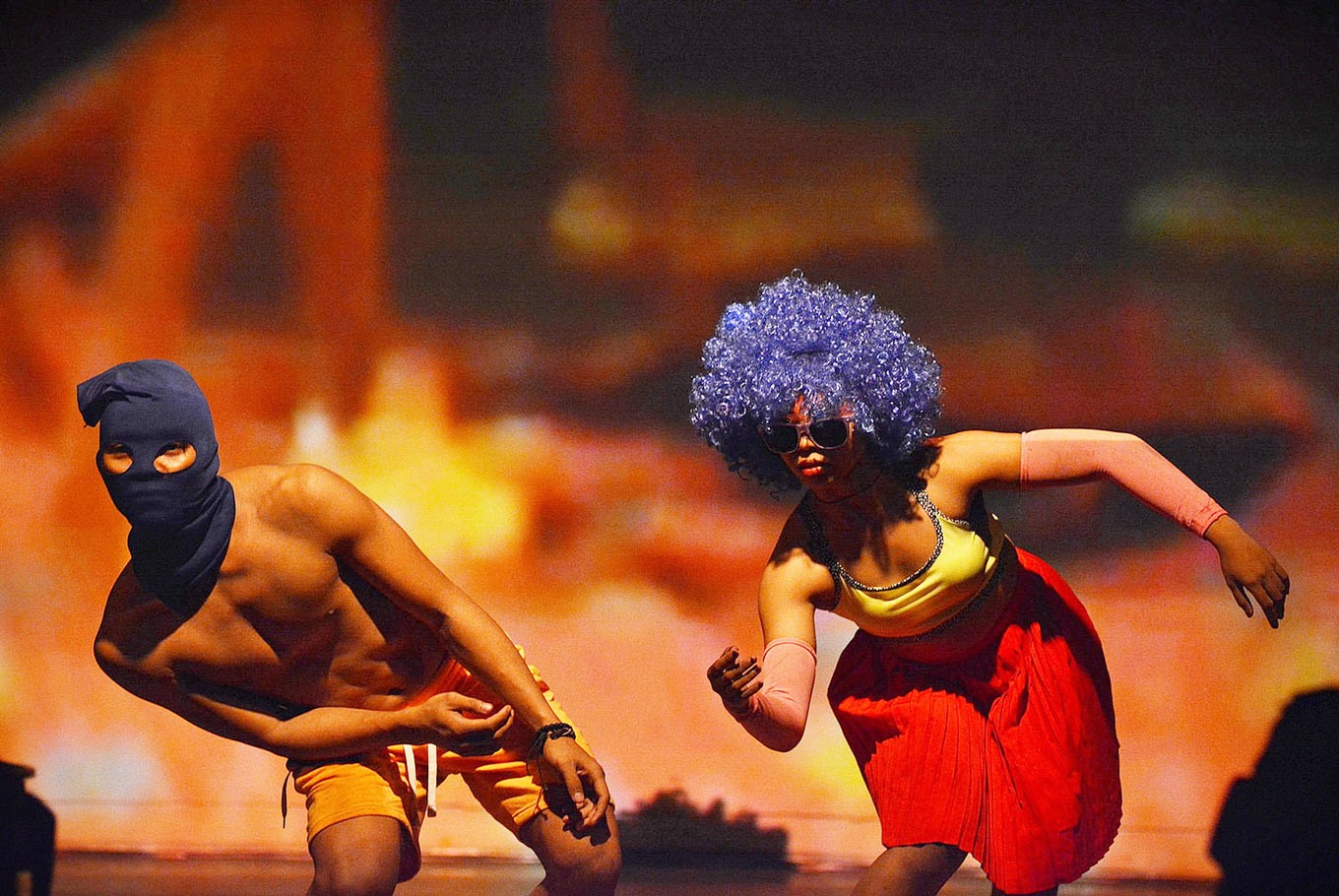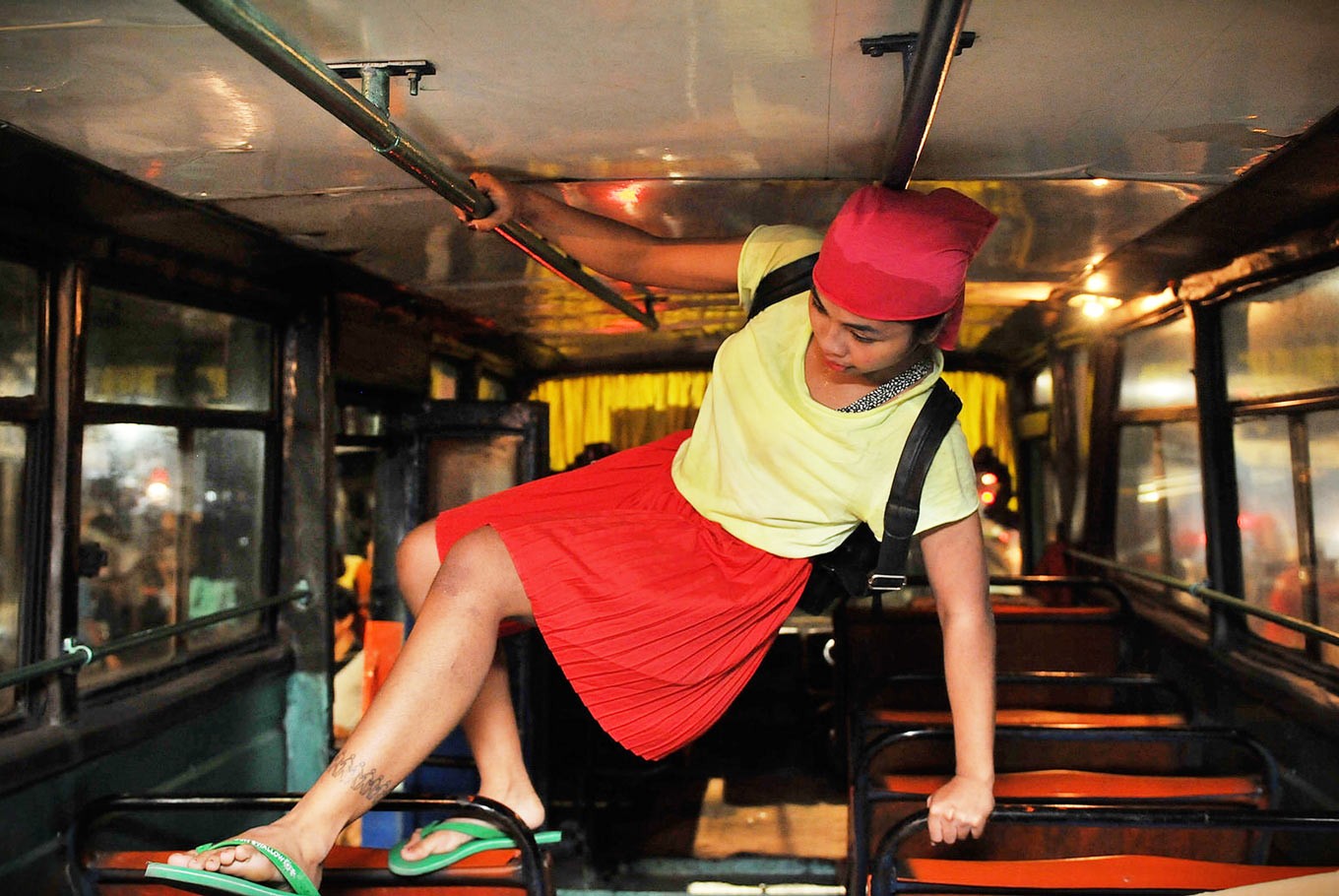Popular Reads
Top Results
Can't find what you're looking for?
View all search resultsPopular Reads
Top Results
Can't find what you're looking for?
View all search results'Angkot' captures our love-hate relationship with Jakarta
Change text size
Gift Premium Articles
to Anyone
A
n innovative multimedia dance performance celebrates the resilience and perseverance of Jakartans who navigate the city’s chaos in order to survive.
Jakartans are already familiar with one of the city’s main features: crowded streets with an abundance of public minivans stopping anywhere they like, dangerously maneuvering here and there and honking their horns all the time.
Indonesian grunge band Navicula writes a song entitled “Kota Metropolutan,” a twist on the phrase “polluted metropolitan city,” in a bid to describe how the chaotic nature of the city makes the vocalist’s head “about to explode.” Yet, despite all the traffic jams and the pollution, we keep coming back to the city for jobs, as well as for its recreation, shopping and entertainment facilities.
Imagine that amid the bustle of motorists that flock to Jakarta’s streets, suddenly, you spot two people dancing around. This was what was offered by choreographer Yola Yulfianti in her new work, Angkot Is the Melting Pot, which was staged at the Salihara cultural center in South Jakarta in the middle of June. The word angkot refers to minivans, one of Jakarta’s most popular public modes of transportation.
On a rehearsal that took place on June 17, the performance started with a live video stream inside the Salihara gallery. Using live audiovisual processing, the show was streamed directly to the gallery through a smartphone.
 Spinning around: Dancers Irfan (left) and Densiel (right) move their bodies to emulate the hands of the clock during the indoor segment of Angkot Is the Melting Pot.(Komunitas Salihara/Witjak Widhi Cahya)
Spinning around: Dancers Irfan (left) and Densiel (right) move their bodies to emulate the hands of the clock during the indoor segment of Angkot Is the Melting Pot.(Komunitas Salihara/Witjak Widhi Cahya)
Two male and female dancers, Irfan and Densiel, moved around in an intersection in the busy Pasar Minggu area with motorists swarming over the streets like ants. Irfan wore a helmet while Densiel wore a bandanna and huge sunglasses that concealed her face.
Sometimes they performed pirouette-like movements on top of road separators in an agile manner like tightrope walkers while gracefully touching minivans that passed by them. Sometimes they did movements reminiscent of pole dancing on the streetlight poles. Sometimes they daringly ran forward and backward, confronting the cars and motors that were making their way down the road, no doubt attracting loud honking.
Read also: Vietnam's capital to ban motorbikes by 2030
The fight-or-flight movements of the dancers, along with Densiel’s movements of “caressing” the minivans and cars that passed by, evoked our love-hate relationship with our frenzied capital city.
Meanwhile, the noise of people honking their horns and the visual image of the road’s chaotic nature never stopped. Some of the audience members watching the rehearsal laughed bitterly as they found the chaos to be familiar and satirical.
After moving around in the streets and dancing their way inside and outside of the markets in the Pasar Minggu area, both dancers apparently took a minivan and made their way to the Salihara gallery to continue their performance inside.
 Attached: A scene from Angkot Is the Melting Pot's outdoor segment.(Komunitas Salihara/Witjak Widhi Cahya)
Attached: A scene from Angkot Is the Melting Pot's outdoor segment.(Komunitas Salihara/Witjak Widhi Cahya)
“I started making live performance videos in 2009 when I took my Master’s degree on urban arts at the Jakarta Arts Institute (IKJ). This one is part of my doctoral degree research in the Indonesian Art Institute in Surakarta, Central Java (ISI Surakarta), which I’ve completed. I researched angkot from Kampung Melayu, East Jakarta, to Senen, Central Jakarta,” Yola told The Jakarta Post after the rehearsal.
She said she had gathered some interesting materials from her observations, particularly on the details of people’s behaviors while in the streets, as well as the ethnic and linguistic diversity from which they came.
“If you take angkot in Surakarta, Central Java, everybody speaks Javanese there, but here they speak the Batak, Sundanese and Javanese languages, among others. I also observed the chaotic and complex nature of our streets as a developing country. Now, I’m quite sad because online ride-hailing applications have taken away passengers from angkot, causing them to be empty,” Yola said.
Read also: Colorful portrait of Padang's public transportation
She said live audiovisual processing was chosen as a medium for this performance as it was deemed the most appropriate to encapsulate the message.
 Urban heroes: Another scene in 'Angkot' performance.(Komunitas Salihara/Witjak Widhi Cahya)
Urban heroes: Another scene in 'Angkot' performance.(Komunitas Salihara/Witjak Widhi Cahya)
“Obviously, you can’t take the angkot to the stage. Therefore, we synchronize the choreography with real situations in the field,” she said.
The live streaming, however, was not without its glitches. The video had to buffer several times because of the lack of an internet connection in several areas around Pasar Minggu.
“We can’t accomplish a stable live streaming in Indonesia because here we don’t have a stable 10MB per second track,” the performance’s audiovisual programmer Patrick Hartono told the Post.
According to Irfan, having to dance on a crowded and chaotic road as an outdoor setting brought with it some challenges, as he had already gotten used to dancing on indoor stages. Thanks to numerous observations that he and Densiel made by frequently taking the Kampung Melayu-Pasar Minggu minivan route, they gradually familiarized themselves with the street’s spatial setting.
Their performance on the street also attracted some attention from bystanders and people who worked in the market.
“A man in the market asked me in a hushed tone whether Densiel was high on drugs. ‘Look how she applies thick makeup and moves around randomly like that,’ he said, ” Irfan quoted the man and laughed.
After the show, Jakarta’s inhabitants continued their complicated relationship with the capital city.











